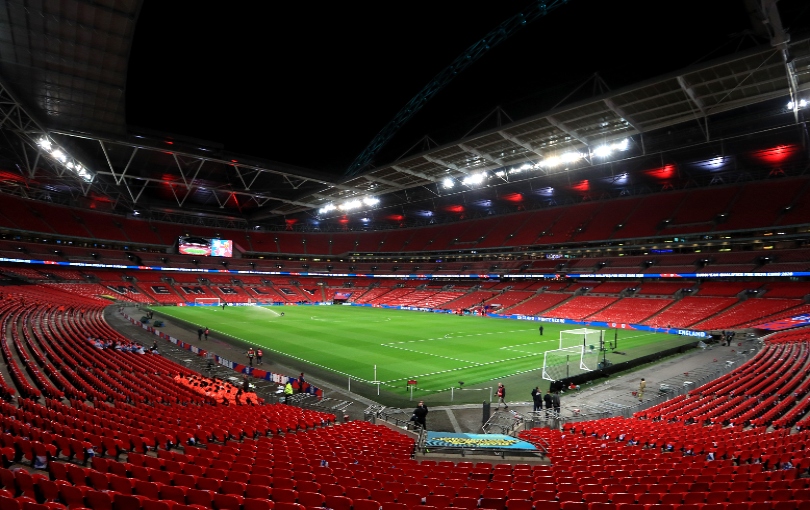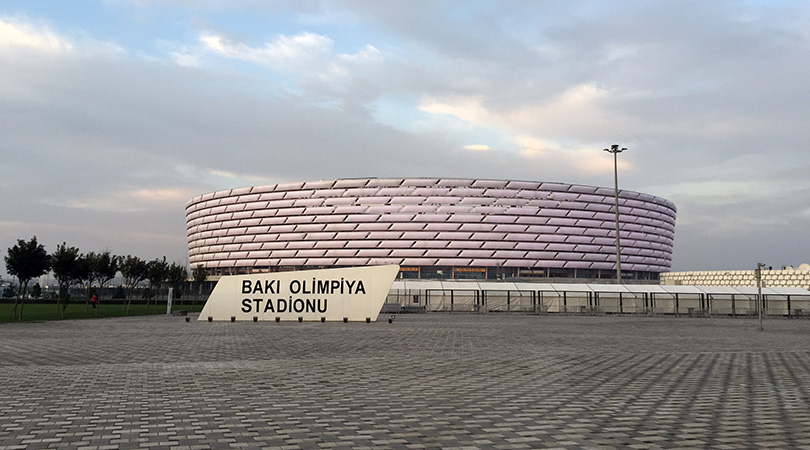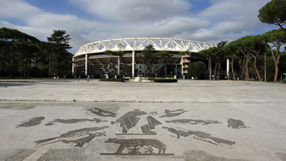Euro 2020 stadiums: Host cities, capacities, and everything you need to know
There are 11 Euro 2020 stadiums across Europe, showcasing some of the best venues for football the continent has to offer

Eleven Euro 2020 stadiums have been confirmed across Europe for this summer's tournament.
The plan for a Europe-wide competition was instigated for the European Championships now delayed 60th-anniversary celebration and means that, travel restrictions allowing, fans will be able to experience games in some of the continents greatest theatres of football.
Here, FourFourTwo gives you the lowdown on all 12 host stadiums.
ALSO READ:
Euro 2020 wall chart: Download free with full schedule, fixtures and dates
Euro 2020 squads: Every confirmed team for the 2021 tournament
The best features, fun and footballing quizzes, straight to your inbox every week.
Euro 2020 stadiums: Johan Cruyff Arena, Netherlands
City: Amsterdam
Capacity: 53,748
Expected Euro 2020 capacity: 25%-33%
Year built: 1996
Who plays there: Ajax
Renamed after the Netherlands and Ajax great in 2018, the largest Dutch stadium was formerly known as the Amsterdam Arena. It was a landmark creation when it opened in 1996, being the first European football stadium to have a sliding roof.
Real Madrid’s 1998 Champions League final victory over Juventus took place here, as did Chelsea’s 2013 Europa League final triumph over Benfica. It has previous European Championship pedigree, too, having been a host venue for Euro 2000.
Euro 2020 stadiums: Baku Olympic Stadium, Azerbaijan

City: Baku
Capacity: 68,000
Expected Euro 2020 capacity: 50%
Year built: 2015
Who plays there: Azerbaijan
A jaw-dropping ultra-modern venue, Baku’s Olympic Stadium is the home to the Azerbaijan national team and played host to the 2015 European Games shortly after its opening.
Costing around $600 million, it took almost four years to build. The ground might already be familiar to Chelsea and Arsenal fans, as the two Premier league sides faced off here for the 2019 Europa League final, which the Blues won 4-1.
Euro 2020 stadiums: La Cartuja, Spain
City: Seville
Capacity: 60,000
Expected Euro 2020 capacity: 30%
Year built: 1999
Who plays there: Sevilla
A late addition to the Euro 2020 roster, Seville's La Cartuja took Bilbao's spot in April, due to the varying levels of COVID restrictions in Spain set by regional governments (Bilbao is in the Basque country, while Seville is in Andalusia).
Built in 1999, it is not actually used by either of Seville's La Liga teams, Sevilla and Real Betis, but has hosted the 2003 UEFA Cup Final between Celtic and Porto, Copa Del Rey finals, and occasional Spanish national team matches.
Euro 2020 stadiums: National Arena Bucharest, Romania
City: Bucharest
Capacity: 55,634
Expected Euro 2020 capacity: 25%-33%
Year built: 2011
Who plays there: FC Steaua, FC Dinamo
Standing on the site of Romania’s old national stadium, Bucharest’s National Arena opened in 2011 and boasts a retractable roof.
Owned by the capital city, it has been rented by Steaua as a permanent home since 2015 and Dinamo since 2012. Atletico Madrid defeated Athletic Club 3-0 here in the 2012 Europa League final.
Euro 2020 stadiums: Puskas Arena, Hungary
City: Budapest
Capacity: 67,155
Expected Euro 2020 capacity: 100%
Year built: 2019
Who plays there: Hungary
Named after the great Hungarian star Ferenc Puskas, Budapest boasts the most modern stadium at the Euros, having opened its doors in 2019.
This will be the ground's first major event, but it has already successfully won the right to stage the 2022 Europa League final.
Euro 2020 stadiums: Parken Stadium, Denmark
City: Copenhagen
Capacity: 38,065
Expected Euro 2020 capacity: 25%-33%
Year built: 1992
Who plays there: FC Copenhagen
Denmark’s largest stadium will host the Danes’ three group games and one Last 16 match this summer, its first use at a major international tournament.
The ground might ring a bell for Arsenal fans, as the two European finals it has hosted both involved the Gunners: their 1-0 Cup Winners’ Cup victory over Parma in 1994 and their penalty shoot-out defeat to Galatasaray in the 2000 UEFA Cup.
Euro 2020 stadiums: Hampden Park, Scotland
City: Glasgow
Capacity: 52,000
Expected Euro 2020 capacity: 25%
Year built: 1903
Who plays there: Scotland, Queens Park
Scotland are back at a major tournament for the first time since 1998, and will be able to count on the famous ‘Hampden Roar’ of their home support (well, at least some of it) for their home games against Czech Republic and Croatia.
Hampden is also home to League Two side Queens Park, Scotland’s oldest club, and it was the biggest stadium in the world between 1908 and 1950, when it could hold a crowd of 149,415 fans. This was also where Zinedine Zidane scored *that* volley for Real Madrid in the 2002 Champions League final against Bayer Leverkusen.
Euro 2020 stadiums: Wembley Stadium, England

City: London
Capacity: 90,000
Expected Euro 2020 capacity: 25% for group matches, higher for knockout stages (to be confirmed early June)
Year built: 2007
Who plays there: England
The home of English football and the largest ground in the United Kingdom, Wembley will host both semi-finals and the final of this summer’s Euros, as well as England’s group games and two last-16 matches.
It's the second-largest stadium in Europe after Barcelona’s Camp Nou and has already hosted some huge events in its relatively short life since replacing the old Wembley: the 2011 and 2013 Champions League finals took place here, won by Barcelona and Bayern Munich respectively.
Euro 2020 stadiums: Football Arena Munich (Allianz Arena), Germany
City: Munich
Capacity: 75,000
Expected Euro 2020 capacity: To be confirmed April 23
Year built: 2005
Who plays there: Bayern Munich
Bayern’s €340 million home opened in 2005 and quickly hosted a major international event, with France’s 1-0 World Cup semi-final win over Portugal taking place there just a year later.
Chelsea fans will fondly remember it as the place that they beat the Bundesliga giants in their own back yard, after a penalty shoot-out victory in the 2012 Champions League final.
Euro 2020 stadiums: Stadio Olimpico, Italy

City: Rome
Capacity: 72,698
Expected Euro 2020 capacity: 25%
Year built: 1953
Who plays there: Lazio, AS Roma
As the name suggests, Rome’s monumental Stadio Olimpico served as the host venue of the Olympic Games in 1960. Due to its use as a multi-sport venue, an athletics track runs around the pitch to keep fans further from the action than they might like.
Nevertheless, the place comes alive on matchday and has witnessed some landmark moments, including the finals of Euro 1968, the 1990 World Cup and four European Cup finals, most recently Barcelona’s 2-0 win over Manchester United in 2009.
Euro 2020 stadiums: Saint Petersburg Stadium (Russia)
City: Saint Petersburg
Capacity: 56,196
Expected Euro 2020 capacity: 50%
Year built: 2017
Who plays there: Zenit
Although its just four years old, Saint Petersburg’s stadium has already played a big role at a major tournament; it hosted seven matches at the 2018 World Cup in Russia, including a semi-final and the third place play-off.
It was designed by Japanese architect Kisho Kurokawa, who wanted to create a spaceship-looking stadium – and succeeded.
ALSO READ
GUIDE Euro 2020 live stream: How to watch every game in the tournament, from anywhere in the world
REFS Euro 2020 referees: who are they, how are they selected and will VAR be in use?
Alasdair Mackenzie is a freelance journalist based in Rome, and a FourFourTwo contributor since 2015. When not pulling on the FFT shirt, he can be found at Reuters, The Times and the i. An Italophile since growing up on a diet of Football Italia on Channel 4, he now counts himself among thousands of fans sharing a passion for Ross County and Lazio.
 Join The Club
Join The Club





